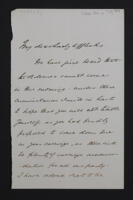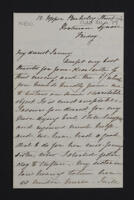(The cards refer to papers in ‘Box File I’ relating to a meeting held on 10 Nov. 1930 at which Pethick-Lawrence addressed Labour Party members on the subject of ‘The Labour Party and Finance’, but these papers have not been found.)
Somerville College, Oxford.—Thanks him for his note (see 1/309). Will instigate an inquiry on the lines he suggests.
London School of Economics and Political Science.—Invites him to a dinner for staff and students connected with the LSE during the period from 1895 to 1914. The Webbs intend to come.
Discusses travel arrangements (in connection with the unveiling of a plaque to Elizabeth Robins; see 3/291). Helen cannot come, as she is going to California to see her son. ‘She says you knew a friend of hers—Mrs Gretel Kettle (née Pain).’
48 Clarendon Road, London, W.11.—Thanks him for his congratulations (on her appointment as a Governor of the BBC?).
London School of Economics and Political Science.—Invites him to bring his wife to the reunion dinner.
Pethick-Lawrence greatly enjoyed the function (the unveiling of a plaque to Elizabeth Robins). Encloses a report of it from the Manchester Guardian.
Accepts his invitation to a reunion dinner (at the LSE; see 2/301).
Treasury Chambers.—Explains why he has not reduced the tax on bedding.
48 Clarendon Road, London, W.11.—Wishes him to meet some of her friends among the Free French, who are concerned by political developments within that movement.
—————
Transcript
48 Clarendon Road, London, W.11
9. II. 42
Dear Fred
First I’ve never congratulated you—or much more us on your leadership. It’s been a piece of good news in a period of bad.
Now I go on to ask your help. I have some friends among the Free French, themselves very anti-Fascist—& more than a little perturbed at the turn things are taking in that movement.
I do think that—even with all you have upon you now—it is important that you should know the dangers, &, still more that you should advise as to whether there are any possible safeguarding measures to be taken.
Could you allow me to bring them to see you at the House for half an hour some day? Friday Feb. 13 or Friday Feb. 20 would probably be the best days for them & for me—have you any possible free times then.
I am here for this week though I am a good deal in the country. Perhaps your secretary could ring me up some time.
I really am sorry to bother you, but it’s one of the cases where one daren’t not try to help: so forgive me!
Yours v. sincerely
Margery Fry
His wife is unable to attend the reunion dinner (see 2/302).
Treasury Chambers.—Thanks him for his help with the Finance Bill.
48 Clarendon Road, London, W.11.—Urges him to support the demand for an inquiry into the conditions in remand homes, if the question is raised in Parliament.
—————
Transcript
48 Clarendon Road, LONDON, W.11.
23rd November, 1944.
Dear Fred,
You will have seen accounts of the attack made by John Watson on the London Remand Homes. I did not feel I could join in this publicly, as I had not visited the temporary Home which is particularly in question, but it was more than a single case which prompted Watson.
So far as I know every single London Children’s Court Magistrate with whom I have worked or talked, has been for some time thoroughly unhappy about the condition of these Homes. The children are not kept clean. One little lad who came to me for a week was dressed in filthy underclothes. Whereas every prison in the country tries to send people to Court looking reasonably tidy, the children are allowed to appear week after week without any attempt being made to wash their clothes or tidy them up in the interval.
There are graver matters of unsatisfactory staff, and of the failure to provide sufficiently classified accommodation for children ranging from little unfortunates, whose only “offence” is their need of care or protection, to the really toughest specimens (and some of them are quite tough) of the London slums.
To my knowledge private attempts to move the L.C.C. have been made again and again by Magistrates who are members of that body, but nothing drastic has been done.
The reason I am now writing to you about this question is that there is a possibility of its being raised in the House next Monday. There seems to be some fear that the issue may be treated on lines of party politics as a Tory attack on a Labour administration. It would be a thousand pities if Labour were not in the forefront in trying to obtain better conditions for these children, almost all of the poorer classes.
An enquiry into the London Homes would not only almost certainly lead to their being improved, but would have useful repercussions on Remand Homes throughout the country.
Actually, the arrangements for remand are one of the weakest links in our defence against Juvenile Delinquency. I do not mind going further and saying that they are probably in some cases actually leading to delinquency. Magistrates are frequently obliged to use the Remand Home, often very much against their will, either because there are no suitable home conditions, or because it is the one way of getting medical and psychological reports made. Moreover, when a child is being sent to an Approved School it is wiser not to send it home while waiting (one does not use a school where another course is possible) and with the present shortage of Approved Schools its stay in the Remand Home may run to many months. Harm may be done during this time, which the Approved School can hardly hope to remedy.
Can you do anything if the question is raised in Parliament to ensure that the demand for an enquiry shall receive Labour support?
Yours sincerely,
[Signed] Margery Fry
Margery Fry
Rt. Hon. F. Pethick Lawrence, M.P.,
House of Commons,
S.W.1.
c.c. to Peaslake, Nr. Guildford.
48 Clarendon Road, W.11.—Expresses sympathy on the death of his wife.
Treasury Chambers.—Will forward Pethick-Lawrence’s letter (see 3/318) and his book A Levy on Capital to the Chancellor (Wood), who is out of London for a few days.
48 Clarendon Road, W.11.—Sends good wishes on his forthcoming marriage.
10 Downing Street, Whitehall.—Thanks him for his welcome to the House of Commons, and congratulates him on his appointment as a minister. Praises his contributions to debates.
Broomhill Bank, Tunbridge Wells.—Acknowledges the receipt of his letter (see 3/318). Will read his book (A Levy on Capital).
Dominions Office.—Returns, and comments upon, a memorandum (apparently about health administration), which he received just before leaving the Ministry of Health. Suggests showing it to Ernest Brown.
Treasury Chambers.—The Chancellor (Wood) has read A Levy on Capital (see 3/319), and will return it at the first opportunity.





























